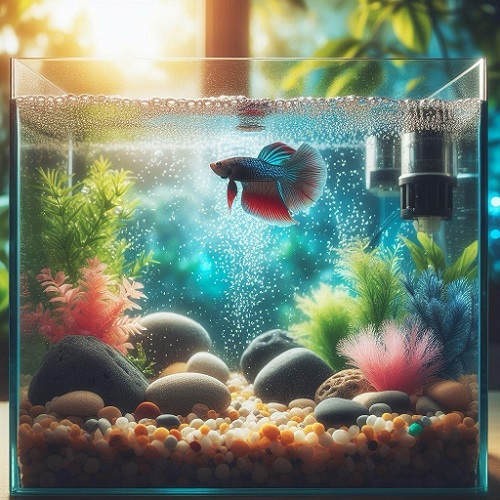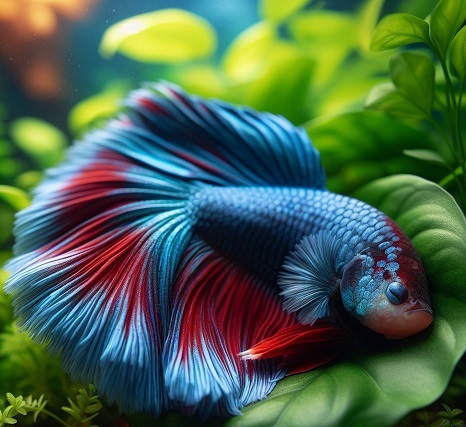One of the most common questions new tank owners ask is “do betta fish need a filter.” While some people agree that betta fish really need a filter, some others are conflicted about it. In this article, we’ll be breaking it down in a way that’s both informative and easy to digest. But first, let’s talk answer this question.
Do Betta Fish Really Need a Filter?
Yes, Betta fish needs a filter to live a healthy life. While betta fish can survive without it, they may not thrive well if the water quality is low, so filtration is very important.
Importance of Filtration in Betta Fish Tanks
Filtration plays a crucial role in maintaining a healthy and stable environment for you bettas.. The main purposes of filtration in a betta fish tank include:
- Removal of Waste and Debris: Filtration systems help remove uneaten food, fish waste, and other organic debris from the water. This prevents the accumulation of harmful substances that can degrade water quality.
- Biological Filtration: Beneficial bacteria colonize filter media and surfaces in the tank, forming what is known as the biological filter. These bacteria break down harmful ammonia, which is produced by fish waste and decomposing organic matter, into less toxic substances like nitrites and nitrates. This process is crucial for the nitrogen cycle, which helps maintain a stable and non-toxic environment for the betta.
- Aeration and Oxygenation: Some filtration systems, especially those with air pumps, contribute to the oxygenation of the water. Bettas, like other fish, require adequate oxygen levels to thrive. Proper aeration ensures that there is enough dissolved oxygen in the water for the betta.
- Mechanical Filtration: Filtration systems also act as mechanical filters by trapping particles and debris in the filter media. This helps in keeping the water clear and free from suspended particles that can cause cloudiness.
For a betta fish tank, it’s essential to choose a filtration system that is appropriate for the tank size and provides gentle water flow. Bettas prefer calm waters, and strong currents can stress them.
Does Dirty Water Affect Betta Fish Health?
Dirty or poor water quality can have negative effects on your Betta’s health. When ammonia or nitrites can accumulate, the toxic nature of the water can cause fin rot, lethargy, and even death.
On the other hand, a well-maintained tank with stable water conditions promotes a robust immune system, vibrant colors, and a happy, active Betta.
How to Know When Betta Tank Needs Filtration
You must pay attention to figure out when to filter your tank. If you notice behaviors like lethargy, fin clamping, or changes in appetite, your tank needs filtration. Additionally, test your water regularly for any spikes in ammonia or nitrite levels. Cloudy water, algae blooms, or an unpleasant odor can also indicate water quality issues.
To Filter or Not to Filter?
Now, let’s address the big question: Should you use a filter in your Betta tank? Let’s weigh the benefits and drawbacks.
Pros and Cons of Using Filters for Betta Fish Tanks:
Pros:
- Maintaining Water Clarity: Filtration maintains water clarity, removes debris, uneaten food, and waste, thereby keeping the water clear.
- Stabilizes Water Parameters: A filter helps maintain consistent water conditions, preventing sudden spikes in harmful substances.
- Promotes Oxygenation: Some filters aid in oxygen exchange, crucial for your Betta’s respiratory health.
- Efficient Waste Removal: Filters actively remove uneaten food and waste, reducing the risk of ammonia spikes.
- Beneficial Bacteria Growth: Some filters support the growth of beneficial bacteria, aiding in the nitrogen cycle and maintaining a healthy balance.
Cons:
- Water Flow Concerns: Betta fish prefer still waters, and some filters may create a current that can stress them.
- Requires Maintenance: Filters need regular cleaning to function effectively, adding to your tank upkeep.
- Natural Environment: In the wild, Betta fish inhabit still waters. A filterless tank may offer an environment that closely mimics their natural habitat.
- Personalized Aesthetics: Some aquarists prefer the simplicity and aesthetics of a filterless tank, allowing the focus to be on the Betta and natural decor.
So Should I Use a Filter for my Betta Tank?
Ultimately, the choice between a filtered or filterless Betta tank depends on your preferences, experience level, and commitment to regular maintenance. Consider your Betta’s behavior, the tank setup, and your willingness to invest time in water quality management.
In the end, whether you opt for a high-tech filter or embrace a filterless approach, the key is to prioritize the well-being of your Betta. Regular water testing, observation, and a thoughtful approach to their environment will ensure a happy and thriving Betta fish.
How to Maintain your Betta Tank Water Quality.
Maintaining a clean and healthy environment is crucial for the well-being of your Betta fish. Here are some tips on maintaining your tank.
- Partial Water Changes: Aim for a 20-25% water change every 1–2 weeks. Use a siphon to vacuum debris from the substrate without disrupting your Betta.
- Algae Control: Wipe off algae from tank surfaces using an algae scraper or sponge. Consider adjusting lighting duration to prevent excessive algae growth.
- Remove Uneaten Food: Carefully scoop out any uneaten food to prevent water contamination. Feed your Betta small portions to minimize leftovers.
- Clean Decor and Substrate: Rotate cleaning different sections during water changes to avoid disturbing the entire tank environment. Gently scrub decorations and rinse substrate to remove accumulated waste.
- Filter Maintenance: Follow the manufacturer’s recommendations for cleaning and replacing filter media. Avoid washing the entire filter in tap water, as it may harm beneficial bacteria.
- Regular Water Testing: Monitor ammonia, nitrite, nitrate, pH, and temperature regularly. Adjust water changes and maintenance based on test results.
- Temperature Control: Keep the water temperature between 78-80°F (25-27°C) for optimal Betta health. Use a reliable aquarium heater to maintain consistent temperatures.
- Quarantine New Additions: Quarantine new plants or tank mates before introducing them to the Betta’s habitat. This helps prevent the introduction of diseases or parasites.
By incorporating these maintenance routines and tips into your Betta care regimen, you’ll create a clean and stable environment, promoting the health and happiness of your finned friend. Regular observation and a proactive approach to tank care are the keys to a thriving Betta fish.
Conclusion
In the world of Betta fish care, there’s a raging debate about weather betta fish need a filter or not. In this article, we have explained that betta fish truly requires a filter. However, this is only my expert opinion, so it is up to you to make the best decision for your betta based on your preference.



